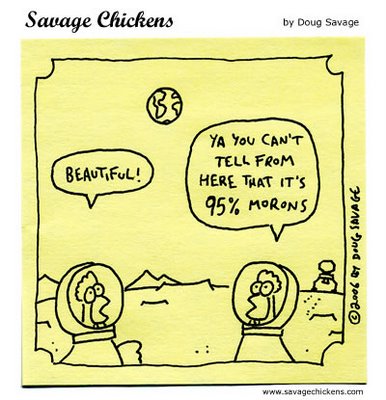
Your host is no theologian, amateur or otherwise. Nor is he a reliable student of church history, or the history of Christian error. But theology, history and heresy are subjects that have long held his interest, and with respect to which he has done a good deal of reading and thinking.
Fortunately, my inexpert meanderings have benefitted from the guidance of my friend The Vestryman who, while he would deny entitlement to the label “theologian,” nonetheless has a remarkable knowledge of that subject, and of church history as well. My “studies” have long since fallen into a pattern. I will explain to him that I have been reading such-and-such, which led me to this-or-that, and that it seemed to me that one might put these notions together in a certain way. I am full of enthusiasm, because I have indeed fit these pieces together all by myself.
My friend will then patiently explain, for example, “Ah yes. Very clever. An excellent argument. That is
Pelagianism. Condemned in the 5th Century. Argued against by St. Augustine, no less. But you see the difficulty with Pelagius is . . . .” There will follow an explanation of the problems and errors to which it leads. [The Vestryman believes that my thinking is somewhat tainted by “semipelagianism,” which he ascribes to my upbringing as a
Methodist.]
I was at first frustrated as this sort of exchange repeated itself. But I came to be rather flattered, in that my own untrained and ill-informed thinking kept independently stumbling upon theological questions thought important enough to have caused great controversies, albeit centuries ago.
I say all this by way of introduction to my reaction to the current “Gospel of Judas” that has the secular media all atwitter. And they are indeed sweaty and breathless as only the innocent can be. And innocent of knowledge they most certainly are.
My own interest in this “revelation” and its underlying text unfortunately could not withstand reading of the document itself. My first reaction, given my own experience, was to guess that this sort of writing was probably well-known, and probably well-known quite some time ago. My second reaction was, “I don’t know much, but I know
Gnosticism when I see it.” And from Gnosticism, it's but a hop, skip and a jump to
Antinomianism, certainly the heretical flavor of the week for our Age.
Today’s
Washington Post report is far better than most have been:
The text's existence has been known since it was denounced as heresy by the bishop of Lyon in A.D. 180, but its contents had remained an almost total mystery. Unlike the four gospels of the New Testament, it describes conversations between Jesus and Judas Iscariot during the week before Passover in which Jesus tells Judas "secrets no other person has ever seen."
The other apostles pray to a lesser God, Jesus says, and he reveals to Judas the "mysteries of the kingdom" of the true God. He asks Judas to help him return to the kingdom, but to do so, Judas must help him abandon his mortal flesh: "You will sacrifice the man that clothes me," Jesus tells Judas, and acknowledges that Judas "will be cursed by the other generations."
Gnosticism! And old, well-known Gnosticism at that!
And I see that I am not alone in finding this sort of thing tedious. Mark Shea, at
Catholic and Enjoying It!, observes:
In a culture so theologically and historically illiterate as ours--a culture that takes the Da Vinci Code with utmost seriousness--it goes without saying that the selfsame people who are exacting to a degree when it comes to the canonical gospels will drink in the Gospel of Judas without a dram of critical thought. You've seen it all before. "Mark places two angels at the tomb, but Matthew only notes one! The witnesses are hopelessly contradictory and worthless!" Likewise, if you point to the overwhelming testimony of the early church on the apostolic origins of the four gospels, you get nitnoid "analyses" of this or that Greek word which somehow is supposed to prove that the gospels are fabrications without any relation to the apostolic testimony.
But when somebody drags out an *obvious* second century document bearing every earmark of a typical gnostic school of thought (Jesus jabbering about "the man that clothed me" and all the typical stuff that went with the whole "spirit=good/body=bad" mindset so foreign to both Jesus and the apostles, credulous gulls in the MSM are ready to treat the notion that this is a genuine record of an eyewitness as settled fact.
The most hilarious irony of all of this is that many of the hedonists and "sacred feminists" who are so eager for the gnostic Jesus would not want to have touched a real gnostic with a barge pole. After all, when your religious theory tells you that matter is a prison and women are the means by which spirit is imprisoned in matter, this tends to give rise to a rather low view of women.
Just so. But none ought be surprised that in this Age, when our most popular actively religious public figure is an
actor of extremely modest talent, there should bob to the surface the bloated corpses of heresies that promise salvation through knowledge of secret mysteries and the performance of magical rituals. [There is not a dime’s worth of theological difference between classical Gnosticism and contemporary Scientology, except the steep Bill of Fare that comes with the latter.] In an Age when sexual deviance is
promoted by the State, it is inevitable that religious and philosophical doctrines which deny the existence of moral norms should reawaken.
Thus, our continued fascination with nonsense such as
The Da Vinci Code, the Gospel of Judas, and American Idol.
I think I’ll take a nap. I can do no other.
 Perhaps THIS will get him to reconsider.
Perhaps THIS will get him to reconsider.
















































